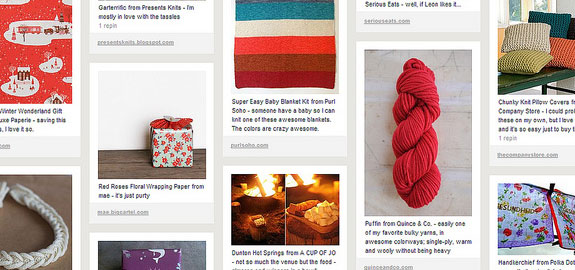This article by Hollis Thomases originally appeared on Inc.com on February 24, 2012.
We’re not saying Pinterest won’t help your business-it very well might, especially if you’re in retail, design or travel. But make sure you’re being smart about it.

Image Credit: Flickr/ohmeaghan
Have you heard about Pinterest, the latest social media darling? It’s already surpassed 11 million user accounts and leading to no fewer than a dozen news headlines a day right now:
- “How Pinterest Helped Clean a House — and Save a Marriage“
- “Can Pinterest Save You Money?“
- “Mitt Romney’s wife gets patriotic on Pinterest“
The hoopla is getting ridiculous … and not just a little annoying.
All About Pinterest
To educate those still unfamiliar with Pinterest, one only has to recall high school days of yore, when high school locker doors were decorated with full-color clippings of favorite things: teen idols, sports figures, fashion looks, candy bar wrappers and tropical environs. Take that notion, sort by category, post online and voilà, you have Pinterest!
And of course, what fun is decorating your locker if you can’t show it off to everyone else in the hall? That’s what Pinterest does through its sharing platform—nothing is private—and its “Pin This” call-to-action buttons.
Setting up an account is relatively easy—just go to the site and request an invitation. To “pin” new images, just adding a “Pin It” button to your browser toolbar—then click your Pin It button from any web page, and select the image(s) from that page you want to add.
Pinterest for Business
Part of Pinterest’s appeal to businesses—besides its numbers—has been its audience. As of late January 2012, Pinterest’s user base was predominantly educated (80 percent had a bachelor’s degree or higher) Midwestern females aged 25-44. Many consumer goods and retail companies would describe this demographic as their “sweet spot.”
These Pinterest users commonly confess to being “Pinterest addicts” because it’s fun, easy and you get to “advertise your hopes and dreams,” as one (similarly addicted)Washington Post columnist put it.
According to Shareaholic, Pinterest “drives more referral traffic than Google Plus, LinkedIn and YouTube combined.” Clearly, if your company makes, hawks, or sells tangible products or destinations, Pinterest has obvious appeal. Just post great photos, encourage pinning, and go off to the races. Companies with loyalty programs (Starbucks) or cult followings (Mashable) can also exploit Pinterest.
Fair Warnings
Still, there are some things that Pinterest seems to be hiding—or at least has been less than forthcoming about — that you may want to know about. Moreover, I’ve got a few general words of caution for you.
1. Pinterest skirts copyright laws—but that doesn’t mean images (or you) are protected. ReadWriteWeb has done a good job covering the topic, explaining how Pinterest takes advantage of a provision in the Internet Service Providers Act to protect itself but how you’re theoretically still liable if you upload an image that you don’t own. If you do own, and post, images and would take issue with someone sharing them on Pinterest, you can essentially opt out your website from Pinterest by inserting blocking code.
2. Pinterest has been quietly making money off your affiliate program.According to The Atlantic, the site has been using a software called SkimLinks, which “looks at links users post to websites, determines if there is an affiliate program to which they can be linked, and appends a code that ensures Pinterest gets credit for (and data from) the referral.” If you have an affiliate program on your site, don’t think you were marketing through Pinterest at no cost to you. Pinterest says it’s no longer using SkimLinks—but the site isn’t saying much about how it is making money, which means you might want to think twice about using it as the keystone of your new digital marketing strategy. (It’s yet another spin on “What Social Media Actually Costs“).
3. Beware the “shiny object” effect. Just because Pinterest is all the rage does not necessarily mean it’s right for your company—or that you should divert your attention from other marketing initiatives to rush to Pinterest. (Have you mastered email marketing yet, for example?) As with any of the other social media platforms, using Pinterest poorly could be more damaging to your brand image than it is helpful.
4. Addiction has a price. Pinterest addiction might seem like folly, but if it begins to contribute or add to the already existing loss of employee workplace productivity that social media has already wrought, that’s no laughing matter.
Pinterest may, in fact, be a great part of your 2012 marketing strategy. Just make sure you don’t get “stuck” in the process.
Web Ad.vantage is a full-service online marketing company with core competencies in search engine optimization, PPC Campaign Management and online media buying. Visit our Internet Marketing Services section to learn more about our full range of services.
WebAdvantage.net encourages the reprinting of our marketing tips and articles. Before doing so, however, please contact us at for permission to do so. The company bio located above is required to accompany any reprint. Thank you in advance for your professional courtesy.
Pragmatic, professional advice with no hidden agenda.

Internet Business Forum








 back to top
back to top






